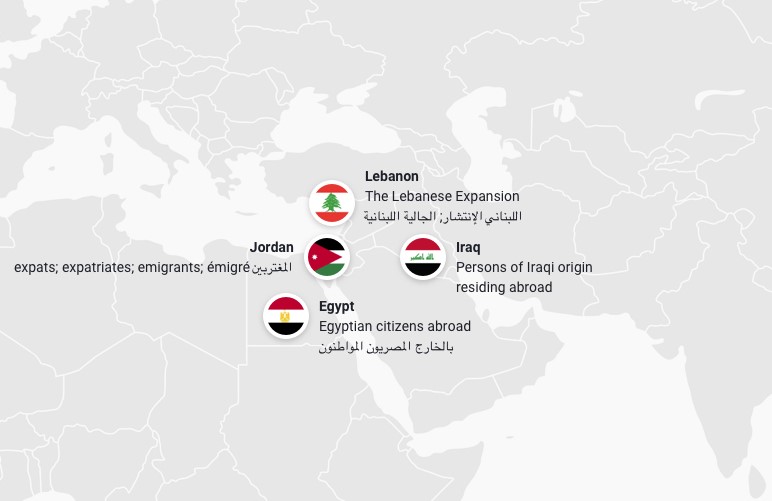Middle East
This page provides an overview of diaspora engagement in the Middle East. It draws on knowledge gathered during the mapping of 5 countries to study relevant policy and institutional frameworks, trends, good practices and recommendations at regional level. A long-form version of the Middle East regional overview is available to download.
One of the main players in diaspora engagement at regional level is the League of Arab States (LAS). Declarations of Arab summits have frequently referred to Arab expatriates, and in 2013 LAS consolidated migration and Arab Expatriates affairs into one department under the name Migration and Arab Expatriates Department (MAED). Another notable advancement in terms of diaspora engagement is the development of closer ties between the LAS and the African Union’s Citizens and Diaspora Directorate (AU-CIDO).
At national level, all five Middle East countries covered by the EUDiF mapping have taken concrete steps to advance diaspora engagement. All countries have created an institution dedicated – a least in part – to diaspora engagement. Furthermore, they all allow dual citizenship and Egypt, Iraq and Lebanon allow the diaspora to vote in national elections. Nevertheless, Iraq is the only country mapped in the Middle East to have developed a diaspora engagement policy.
The League of Arab States consolidated migration and Arab Expatriates affairs into one department under the name Migration and Arab Expatriates Department (MAED). The idea behind this consolidation was to ease the work in the field of migration and expatriates and help the LAS to coordinate its activities more effectively.
The Arab Regional Consultative Process on Migration and Refugee Affairs (ARCP) is an informal forum permanently chaired by the LAS that facilitate dialogue and cooperation between its 22 member states on migration issues. It focuses – among other things – on migration and development, brain drain and remittances.
Developed with the support of ICMPD, the policy foresees facilitating the exchange of diaspora human capital, including in areas such as academic exchange and skills transfer.
The Five Year Strategy and Action Plan for Expatriates aims to collect information on Jordanian professionals working abroad in OECD and Arab Countries, to develop policies on return migration, and to encourage remittances and local investments.

The Lebanese government adopted a “policy of concord” vis-à-vis the diaspora. As part of this, the government encourages pacific links among different Lebanese confessional groups residing abroad and encourages them to establish unions and associations.The “policy of concord” is a unique approach in the region rooted in and reflective of Lebanon’s heterogeneity. The Government encourages the transfer of remittances, facilitates returns, promotes dialogue with international organisations dealing with emigrants’ issues (such as UNDP), and motivates its expatriates to exercise their democratic rights. The adoption of the Voting for Lebanese Diaspora law, as part of the Lebanese electoral law and the Lebanese Citizenship Reacquisition Law, remain two of the Government’s main achievements.

Since the 1970s, Egypt has implemented various initiatives to engage with its diaspora including the adoption in 1983 of Law 111 on Emigration and Sponsoring Egyptians Abroad which incentivised Egyptians abroad to be engaged in the development of Egypt. In 2015, the reestablishment of the Ministry of State for Emigration and Egyptian Expatriate Affairs demonstrated the revival of the Government’s will to engage the diaspora and strengthened its capacity to do so. In 2017, Egypt started to develop a national diaspora engagement policy and strategy, although the status of the instruments is still unclear. Egypt Vision 2030, Egypt’s strategic objectives vis-à-vis emigration and Egyptian citizens abroad include strengthening the links of Egyptians abroad and their children with the homeland, demonstrating a long term approach to diaspora engagement.
The term ‘diaspora’ is not used in the region due to its historic use to refer to traumatic dispersal from a given homeland, in particular the dispersion of Jewish people. In general, the terms ‘expats’ or ‘expatriates’ are preferred and used interchangeably with ‘emigrants’ or ‘émigré’.

Diaspora engagement remains unequal in the region, with variying levels of success. Countries of origin should aim at better showcasing investment opportunities for their diaspora. They should also take advantage of the skills and networks of the diaspora that could be valuable to drive entrepreneurship in the region and strengthen the capacity of national institutions.
Building adequate diaspora engagement strategies and policies requires solid and detailed knowledge of the diaspora. Data collection exercises, such as diaspora mapping and profiling of the diaspora in host countries, are a key first step in this regards. The capacity to collect and analyse the data of national institutions in the Middle East needs strengthening. However, when such exercises are implemented, countries of origin must take advantage and be willing to integrate the data into their strategic planning.
Due to the instability in the region, several countries in the Middle East need to build trust with their diaspora. Steps to be taken to build trust and further involve the diaspora in national affairs include providing better consular services and showing interest in the diaspora’s potential, beyond merely the financial contributions.
Adequate financial regulations should be developed in the Middle East to match the diaspora with investment opportunities in key sectors. In parallel, there should be work done to ease and reduce transaction costs for remittances flows and improving access to the banking systems.
Due to the conflict history in the region, the diaspora is often polarised and distrustful of other groups. Being able to coordinate and communicate collectively would give more weight when engaging with the country of origin and more power when lobbying the government to have access to rights and opportunities in the country of origin.
The diversity of the Middle East requires donors to grasp local realities and build on existing efforts in order to respond to the specific needs of each individual country. The divergent local realities, diaspora diversity, and (often) historic mistrust mean that neutral support could accompany states and diaspora organisations to co-develop the most appropriate tools and technical skills needed over time.